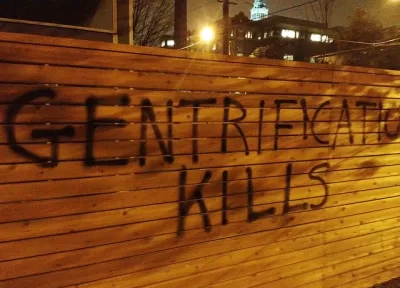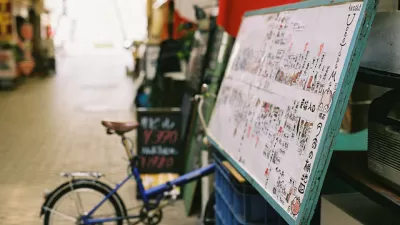On the ground, combating gentrification means putting a stop to cost-driven displacement and evictions. Grassroots organizations in some of the hardest-hit cities have dedicated themselves to that task.

Alexis Stephens reports on continuing activism in three cities to curtail displacement and evictions brought about by gentrification. Shifting land use patterns in Detroit, San Francisco, and Brooklyn have all met vocal opposition from longtime residents. From the article:
- Detroit: "An unprecedented 62,000 homes are scheduled for a mass foreclosure by Wayne County on March 31. These properties represent $326.4 million in taxes, interest and fees to Detroit. [...] An emergency assembly organized by the Moratorium Now Coalition took place on March 14 at Christ Church Detroit. Leaders of the coalition say this event should be treated as the same type of state of emergency responsiveness as a natural disaster."
- San Francisco: "[Anti-Eviction Mapping Project] has compiled data showing a loss of more than 3,278 rent controlled units in the city from 2007-2014. Counting the nearly 4,978 affordable housing units produced in the same time period, the net affordable housing stock in the city is only up 1,700 units."
- Brooklyn: "A project of the grassroots organization Equality for Flatbush, B4G is currently hosting forums throughout Brooklyn this spring discussing their six-point 'This is a No-Eviction Zone' campaign and providing legal, housing and community organizing resources."
FULL STORY: How Activists in 3 Cities Are Fighting Evictions

Planetizen Federal Action Tracker
A weekly monitor of how Trump’s orders and actions are impacting planners and planning in America.

Congressman Proposes Bill to Rename DC Metro “Trump Train”
The Make Autorail Great Again Act would withhold federal funding to the system until the Washington Metropolitan Area Transit Authority (WMATA), rebrands as the Washington Metropolitan Authority for Greater Access (WMAGA).

The Simple Legislative Tool Transforming Vacant Downtowns
In California, Michigan and Georgia, an easy win is bringing dollars — and delight — back to city centers.

The States Losing Rural Delivery Rooms at an Alarming Pace
In some states, as few as 9% of rural hospitals still deliver babies. As a result, rising pre-term births, no adequate pre-term care and "harrowing" close calls are a growing reality.

The Small South Asian Republic Going all in on EVs
Thanks to one simple policy change less than five years ago, 65% of new cars in this Himalayan country are now electric.

DC Backpedals on Bike Lane Protection, Swaps Barriers for Paint
Citing aesthetic concerns, the city is removing the concrete barriers and flexposts that once separated Arizona Avenue cyclists from motor vehicles.
Urban Design for Planners 1: Software Tools
This six-course series explores essential urban design concepts using open source software and equips planners with the tools they need to participate fully in the urban design process.
Planning for Universal Design
Learn the tools for implementing Universal Design in planning regulations.
Smith Gee Studio
City of Charlotte
City of Camden Redevelopment Agency
City of Astoria
Transportation Research & Education Center (TREC) at Portland State University
US High Speed Rail Association
City of Camden Redevelopment Agency
Municipality of Princeton (NJ)




























